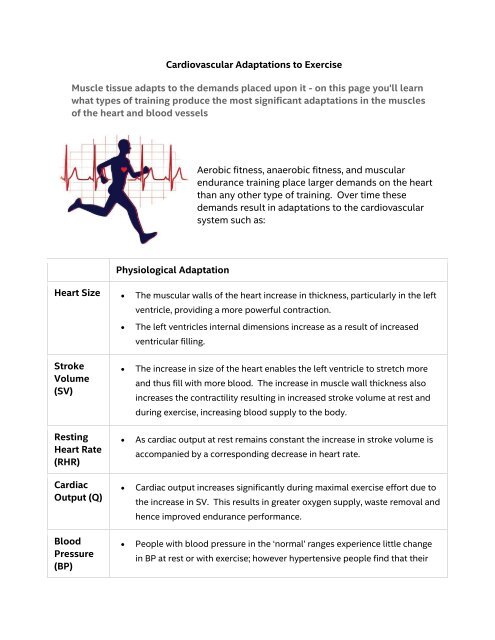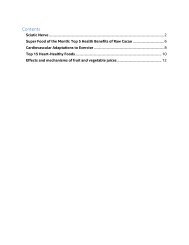Create successful ePaper yourself
Turn your PDF publications into a flip-book with our unique Google optimized e-Paper software.
Cardiovascular Adaptations to Exercise<br />
Muscle tissue adapts to the demands placed upon it - on this page you'll learn<br />
what types of training produce the most significant adaptations in the muscles<br />
of the heart and blood vessels<br />
Aerobic fitness, anaerobic fitness, and muscular<br />
endurance training place larger demands on the heart<br />
than any other type of training. Over time these<br />
demands result in adaptations to the cardiovascular<br />
system such as:<br />
Physiological Adaptation<br />
Heart Size The muscular walls of the heart increase in thickness, particularly in the left<br />
ventricle, providing a more powerful contraction.<br />
<br />
The left ventricles internal dimensions increase as a result of increased<br />
ventricular filling.<br />
Stroke<br />
Volume<br />
(SV)<br />
Resting<br />
Heart Rate<br />
(RHR)<br />
Cardiac<br />
Output (Q)<br />
Blood<br />
Pressure<br />
(BP)<br />
<br />
<br />
<br />
<br />
The increase in size of the heart enables the left ventricle to stretch more<br />
and thus fill with more blood. The increase in muscle wall thickness also<br />
increases the contractility resulting in increased stroke volume at rest and<br />
during exercise, increasing blood supply to the body.<br />
As cardiac output at rest remains constant the increase in stroke volume is<br />
accompanied by a corresponding decrease in heart rate.<br />
Cardiac output increases significantly during maximal exercise ef<strong>for</strong>t due to<br />
the increase in SV. This results in greater oxygen supply, waste removal and<br />
hence improved endurance per<strong>for</strong>mance.<br />
People with blood pressure in the ‘normal’ ranges experience little change<br />
in BP at rest or with exercise; however hypertensive people find that their







